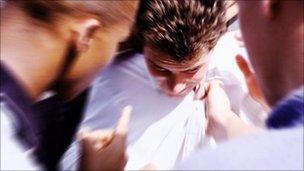Gove: Use no-notice Ofsted checks to tackle behaviour
- Published

Teachers have the power to use 'reasonable force' to separate fighting pupils
England's schools watchdog should carry out more no-notice inspections to stop schools hiding bad behaviour, the Education Secretary has said.
Launching new guidelines on school discipline, Michael Gove said some schools asked unruly pupils to stay at home when Ofsted inspectors were due.
The guidance clarifies teachers' powers to restrain unruly pupils and search them for banned items.
One teaching union said the guidance was "confusing" and "populist".
Mr Gove said schools faced a "real behaviour problem", with almost 1,000 children in England suspended every school day for abuse and assault.
He said he had been told by teachers that "weak teachers are invited to stay at home" during Ofsted inspections.
"We make sure disruptive pupils don't come in, and the best teachers are on corridor duty. We put on our best face for inspections," he said teachers had told him.
'Teachers confused'
A Department for Education spokesman said more no-notice inspections were needed in "the small number of schools with very bad behaviour problems".
"If we don't tackle this, we won't tackle the very wide and damaging gap in performance between the best and worst schools - a gap that is creating an unemployment crisis for the future," the spokesman added.
Since September 2009, Ofsted has carried out only five full no-notice inspections, but it is currently consulting on proposals to alter the way it does school inspections.
The school discipline guidance has been slimmed down from 600 pages to just 50, and has been published in draft form for consultation.
The Department for Education says the old document "left teachers confused about their powers", and the updated version "unequivocally restores adult authority to the classroom".
The new version strengthens advice on when head teachers' should consider pressing charges if pupils or others make false allegations against teachers.
It says the default position when a teacher is accused of misconduct in an incident should be to assume the teacher has behaved reasonably - unless the complainant can show that a teacher has behaved unreasonably.
Schools should also not automatically suspend teachers accused of using force unreasonably and malicious allegations should not be included in employment records, the guidance says.
The guidance also outlines teachers' powers included in the Education Bill currently going through parliament, which will:
Extend powers to search pupils for any items that are banned by school rules such as mobile phones, alcohol, illegal drugs and stolen property
Stop appeals panels sending excluded children back to the school from which they were excluded
Give teachers anonymity when facing allegations
Remove the requirement on schools to give parents 24 hours' notice of detention
The documents also advise against "no touch" policies in schools, stressing that teachers can legally use "reasonable force" to restrain pupils.
'Common sense'
Education Secretary Michael Gove has also appointed head teacher Charlie Taylor as a behaviour adviser.
Mr Taylor, currently a head teacher at a London school for children with behavioural, emotional and social difficulties, is tasked with improving teacher training on school discipline, and working with the police to speed up investigations into allegations against teachers.
"For far too long, teachers have been buried under guidance and reports on how to tackle bad behaviour. I am determined to make sure I help schools put policy into practice," he said.
The NASUWT teaching union said the updated guidance seemed "largely to be announcements of sanctions that schools already have, or confusing statements apparently more about securing populist public support than backing teachers".
It said key details remained unclear about the implications of schools trying to prosecute students over false allegations.
Schools can already exclude pupils for making false allegations, but changes under which schools retain responsibility for excluded pupils' results make them less likely to do so, the union argued.
"All of these provisions, however, continue to miss the point of what teachers need to maintain high standards of pupil behaviour," said general secretary Chris Keates.
"The feedback the NASUWT has received from thousands of teachers is that it is not more sanctions they want but backing by school leaders to enable them to feel confident to use the sanctions available. Too many teachers report that the school's first response to poor behaviour by pupils is to blame the teacher," she said.
The National Union of Teachers said it welcomed the "common sense approach" of the new guidance on false allegations, but said head teachers were unlikely to want to "criminalise" young people who had wrongly accused a teacher.
But it warned that the extended powers for teachers could put pressure on schools and their staff.
"Teachers are generally reluctant to take on such 'policing' roles - particularly given the potential for damage to productive relationships between staff and young people; and the increased potential for litigation if a member of staff chooses or fails to search a pupil who later commits an offence," said general secretary Christine Blower.
- Published17 November 2010
- Published20 October 2010
- Published13 October 2010
- Published5 October 2010
- Published12 August 2010
- Published10 July 2010
- Published7 July 2010